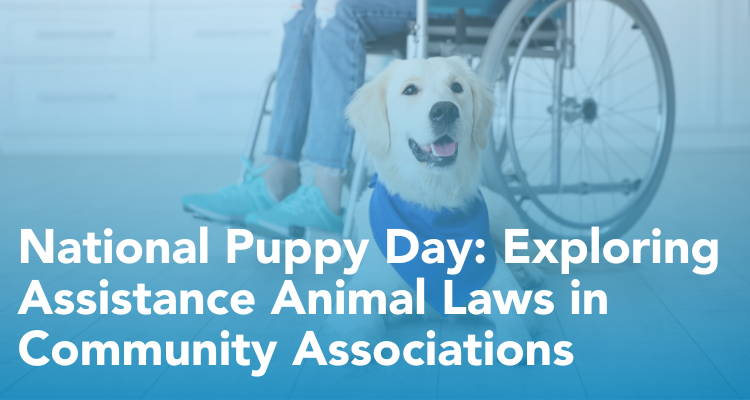This Saturday, March 23 is National Puppy Day, where dog owners and lovers come together over their shared appreciation for our four-legged companions. National Puppy Day is meant to raise awareness of the number of dogs that need to be rescued each year and help prospective pet owners consider adoption.
Community association residents should know their association’s pet policies before getting a dog, especially those pertaining to assistance animals. Please note, assistance animals are not considered pets subject to restrictions from the community association’s governing documents. Most pet-related policies are not applicable to residents with assistance animals.
Assistance animals play an important role in the lives of people with disabilities. The federal Fair Housing Act, the Americans with Disabilities Act, as well as state and local laws govern assistance animals in community associations. CAI tracks state legislation relating to assistance animals in community associations here.
Assistance animals are classified into three groups:
- Service animals are defined as dogs individually trained to perform specific tasks to assist an individual with a physical or psychological disability as defined by the ADA in the activities of normal living. Service animals are federally protected by ADA and FHA. Community associations that do not allow animals are required to grant a request for a service animal as long as that request follows guidelines outlined by the Office of Fair Housing and Equal Opportunity.
- Emotional support animals can be any animal species with a few rare exceptions. Their use is prescribed by a qualified physician or mental health professional based upon a disability-related need. They are recognized by the Fair Housing Act and Rehabilitation Act but are not recognized under the Air Carrier Access Act and the Department of Transportation Guidance Concerning Service Animals in Air Transportation.
- Therapy animals can be any animal species. They are not recognized by federal law nor is there a federal requirement regarding identification, though animals usually wear some sort of indicator. They provide psychological or physiological benefit to individuals or groups in a clinical environment and are typically registered or certified by an animal-assistance intervention organization after successful training and evaluation.
Community associations must recognize the rights of individuals with disabilities to receive the assistance they need within their home and must comply with federal laws guaranteeing such rights.
Guidance from the U.S. Department of Housing and Urban Development outlines the process a housing provider must follow in considering a request for an assistance animal exemption. The process also highlights the importance of reliable documentation for assistance animals, clarifies the types of animals eligible for reasonable accommodation under the FHA, and the differences in observable and non-observable disabilities including cases that may require documentation of disability.
Check out CAI’s Guide to Assistance Animals to learn the differences between them and the applicable federal and state laws. CAI and its members support the FHA, which prohibits housing discrimination based on race, color, religion, sex, familial status, national origin, or disability.
CAI also created guides for board members, community managers, and residents who want to know more about assistance animals.



